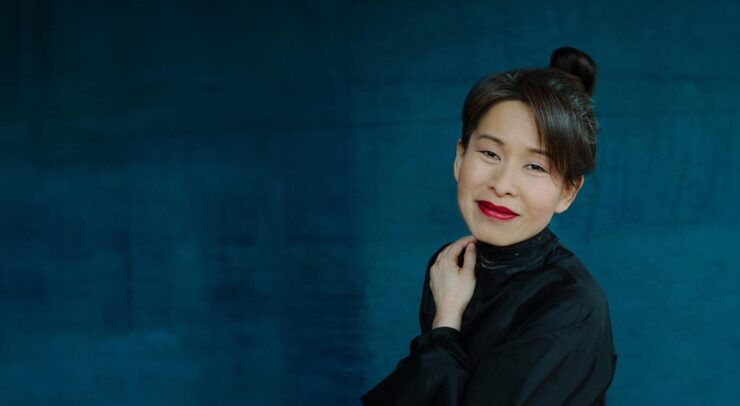We clung to Thúy’s every word, charmed by her humor and unparalleled storytelling.
After being moved to tears by Ru, a film inspired by Kim Thúy’s first novel of the same name, I was eager to hear the Vietnamese-Canadian writer’s journey from a 10-year-old child refugee fleeing the Vietnam War to an award-winning author.
After being introduced by the associate vice-president of francophonie, Yves Pelletier, Thúy leapt onstage to appreciative laughter and applause as she made her first joke of the many that would pepper her presentation. Clutching a notebook in one hand but hardly glancing at it, she drank the audience in with sparkling eyes, voicing her surprise at the high turnout. Indeed, around 300 people attended the in-person event, and 200 tuned in to the online stream.
Once she had set the historical stage for the Vietnam War, Thúy relived the Communist soldiers invading her family home, and the incredibly tense and perilous climate plaguing her childhood: the taboo to express one’s emotions or any opposition to the rising Communist regime, for fear of being publicly denounced and punished, and the prohibition of music or reading.
Mandatory military service for young Vietnamese men, a sure death sentence, forced the family to flee the country as boat people. Blindly entrusting their life-savings to complete strangers, the family were mercifully granted passage on a small boat.
I was shocked yet able to appreciate the raw, matter-of-fact portrait Thúy painted of the nauseating conditions of 218 people overcrowding a 10-meter long barque. It made me reflect on my own family members’ experiences, some of whom were boat people as well; they faced imprisonment, torture, the threat of pirates, and death when they were caught by partisans of the Communist regime.
Suffocated like sardines in a can, the passengers on Thúy’s boat were paralyzed as they vomited over themselves. The direness of the situation was punctuated by the appointment of Thúy’s father, a philosophy professor without any boating experience, as captain of the vessel. The responsibility fell to him since he alone had an inkling of how to read the stars to determine where they were going.
The boat washed onto a shore in Malaysia before promptly being torn to pieces before their eyes by a storm. The passengers were herded into an overflowing refugee camp, where they made the best of the 40-degree weather. They choked down meagre servings of fish wriggling with worms, their noses becoming desensitized to the thick smell of feces solidifying in a hole shared by the camp’s inhabitants. This didn’t stop Thúy’s mother from setting up a school at “The Rock” (“La Roche”), where she gathered the professors from among the refugees to teach the children. Thúy remembered learning about fractions, tracing them in the dirt by The Rock.
Different countries sent representatives to select the refugees, according to certain criteria. For instance, Sweden only took families with a handicapped member. The Canadian delegation was the first to arrive. Thúy’s family was chosen quickly since both of her parents spoke French, and were able to act as interpreters.
After a 30-hour plane trip, delayed by 12 hours, Thúy found herself heading toward Granby, Quebec, a city that had volunteered to welcome Vietnamese refugees. Dazzled by the snow she saw for the first time and the frigid winter temperatures, she remembers the shock at being swept up by the Granby residents, who had been awaiting the refugees arrival with great anticipation. Despite being complete strangers, they hugged her fiercely, even lifting her frail, thin body clean off of the ground, completely disregarding the dirt and grime that had accumulated from her travels.
No one had seen themselves in weeks, yet according to Thúy, the first time she saw herself again after her harrowing journey was not in a mirror; it was in the Granby residents’ eyes. “I had never seen myself so beautiful, and I have never seen myself as so beautiful again,” she said; they had greeted her with overwhelming warmth and love, without expecting anything in return.
Thúy truly fell in love with Quebec, soaking in its language and culture like a sponge, with a renewed sense of hope and ambition; anything was now possible. The Vietnamese refugee families were showered with gifts of food, bicycles, and meal invitations – it was to the point where an announcement had to be made over the radio to tell them to stop – the Vietnamese families’ fridges simply weren’t large enough to contain all the food! They even developed a lottery system so that each Granby family eagerly awaiting to host a Vietnamese refugee child for lunch could get a chance.
Once she had gotten a good grip on French, Thúy’s mother sent her to the cadets to learn English. Thúy fondly remembers picking up the word “asshole” out of context, and jokingly added that it’s to her immense relief that she figured out what it meant, or she might have named her first child “asshole,” in homage to the first English word she learned.
Wanting to explore French literature in university, but not knowing what concrete professions this could lead to, Thúy ended up studying translation instead. She remembers getting a lot of zeros, since she says neither her French nor English were that strong – now, however, she holds the Governor General’s Literary Award for French-language fiction (Ru, 2010), and honorary doctorates from anglophone universities like Concordia. She added as humor that she suspects that the University of Montreal let her graduate simply to get rid of her. Indeed, despite her low grades, she was relentless in pursuing her education.
Thúy went on to study law, and shortly thereafter, became a lawyer. After a trip to Vietnam, she returned to Canada and opened her own restaurant, wanting to share Vietnamese cuisine with Quebecers, despite not knowing how to cook. Every night, she would call her mother to learn a new recipe, and that would be the only dish on the menu the next day. Thúy laughed as she remembered customers congratulating her on her new “concept.”
Though her restaurant was a financial failure – despite her customers’ best efforts, who even paid more than she was asking in an attempt to prevent it from closing down – it ultimately led her to writing. Exhaustion after a long day’s work at the restaurant threatened to take over during her car rides home, so to keep herself awake, she began making lists: to-do lists, plants, capital cities,…these gradually turned into longer narratives, memories from her childhood. Some of her regular customers encouraged her to enter writing festivals and submit her work to publishing houses. One of them was André Dupuy who, unbeknownst to Thúy at the beginning, was a film producer. He took her early notes for Ru to a publisher, and eventually bought the rights for the film adaptation.
By this time, the conference organizers were rushing Thúy to finish her presentation for lack of time, and the audience groaned in disappointment – it was like being a child again, enraptured by a story, and being told we had to go to bed. We could have listened to Thúy for hours, clinging onto her every word, and charmed by her self-deprecating humor yet absolutely clear and undeniable brilliance.
Two students were brought onstage to ask pre-selected audience questions about Thúy’s advice about entrepreneurship, facing indecision, her thoughts on discrimination, her mental health, and future projects. Though she had criticized her own French and English throughout the presentation, she seamlessly transitioned between the French and English questions, providing sincere and eloquent replies carrying concrete advice.
She emphasized living in the present, and to simply “pick one” when struggling with indecision – taking the plunge could lead to a new road you didn’t even know existed before, like in her case with the restaurant. Indeed, it took a financial and physical toll on her, but was essential in her journey to become a writer.
I was also intrigued by her thoughts on discrimination; according to her, it will always exist, since we’re taught that anything different is undesirable from a young age. She mentioned the common exercise children get in grade school: when faced with three fruits and a vegetable, they’re asked, “Which one doesn’t belong?” rather than “Which one is different?” We must make a conscious effort to disentangle ourselves from these preconceived notions. Rather than arguing whether a point of view is wrong or right, we should be asking ourselves how the perspective came to be.
She confided that her upcoming projects may be about what comes after immigration. The focus often falls on the journey to a new destination, not what it takes to acclimate to it and find a new identity afterward.
Thúy finished her presentation by sharing a striking poem by Ernst Jandl, an Austrian poet. The audience held its breath as her voice rippled through the room:
être allongé contre toi
je suis allongé contre toi, tes bras
me tiennent. tes bras tiennent plus que ce que je suis. tes bras
tiennent ce que je suis
quand je suis allongé contre toi et
que tes bras me tiennent.”
Here is my translation of the poem to English:
to be lying against you
I am lying against you, your arms
hold me. your arms hold me more than I am. your arms
hold what I am when I am lying against you and
your arms are holding me.
Thúy received a standing ovation and was promptly swarmed by a crowd as she stepped lightly off the stage, signing books and chatting animatedly with the audience members. Her presentation was profoundly moving and inspiring, and I left the room with a renewed sense of purpose and ambition.
If you ever get a chance to hear Kim Thúy speak, to watch Ru or to read any of her books, I cannot recommend it enough. A speakers’ words have never electrified or motivated me the same way, and I hope her message resonates with you too.





